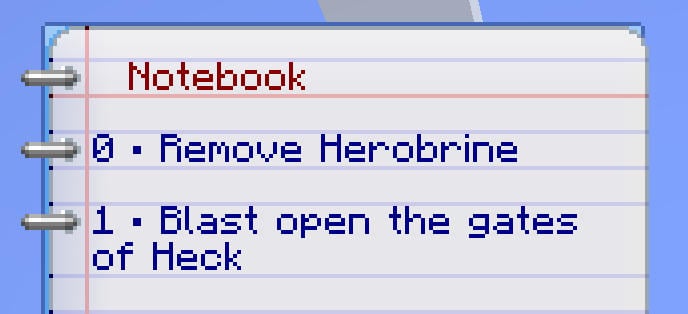Back-burner
A fully client-side to-do list, displayed on the side of the screen, and operated through commands.
Each world and server saves its to-do list separately.
File locations
Data is saved as a simple JSON arrays of strings.
For singleplayer worlds, they are saved at the root of the world's directory as backlog.json
For multiplayer, they are saved under .minecraft/remote_backlogs/, using the ip/address and port of the server as the file name. LAN worlds are handled the same way.
Config
The config can be edited in-game by using Cloth-Config and ModMenu. This will let you change the position and size of the hud.
Commands
By default, all sub-commands use /note as a root. The name of the root can be changed in the config screen in case of conflict.
<text> arguments are greedy, and do not need to be quoted.
<index> arguments also support first and last as alternatives to numeric values.
Adding items
push <text>Adds an item at the top.queue <text>Adds an item at the bottom.add|insert <index> <text>Adds an item at an arbitrary index.
Removing items
popRemoves the top-most item.shiftRemoves the bottom-most item.pop|remove <index>Removes the specified item.clearRemoves everything.
Editing
edit <index> <text>Overwrites an existing item. Auto-completion will suggest the old value.bump <index>Moves an item one place upward.bump <index> <offset>Moves an item the given amount of places. Positive values move upward, negative values move downward.move <from> <to>Moves an item from one index to another.
Hud
hide <bool>Toogles the backlog hud On or Off. Can be called with no argument.
Debug
These commands shouldn't ever need to be used for normal usage.
saveForces saving the backlog to its file on the disk. Automatically called whenever you make any change to your backlog.reloadForces loading the backlog as is saved on-disk. Automatically called upon joining a world.
Resource Packs
In addition to textures, resource packs can alter some minor aspects of the backlog HUD's layout, by modifying the corresponding texture's .mcmeta file.
basis: {width,height} The base size of the element on screen.
For 16x-packs, this is strictly equal to the texture's size. For 32x-packs, this is half the texture's size. So on, so forth. No specific texture size is expected for these elements; the values specified here are what define the expected sizes.basis: {fill} (boolean) Whether the element should take as much horizontal space as allowed (true) or shrink to fit the text (false).ninepatch: {top,bottom,left,right} The margins of the 9-patch. I.e, the areas that won't be stretched to fit element's size.padding: {top,bottom,left,right} Empty space that will be added around the element. Negative values can be used to remove space, and make elements overlap.textarea: {top,bottom,left,right} Margins inside the texture, which will not be filled with text.text: {...} The different colours of the text for that element, formatted as a#aarrggbbhex codes. The alpha component is mandatory.colouris the text's main colouroutlinedefines a main outline colour.outerlineadds a thicker outline around the first outline. Requires the former to be defined.
text: {shadow} (boolean) Whether the text should have a shadow. Incompatible with any outline.
External resources
Project members
Estecka
Author

